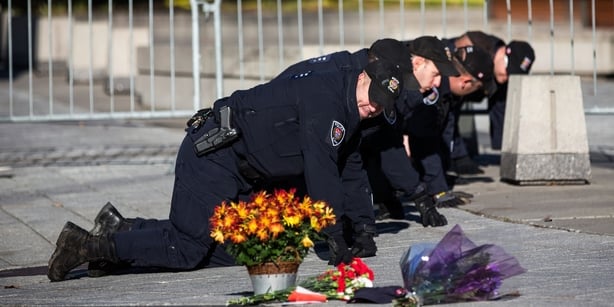The gunman involved in yesterday's shooting at the Canadian Parliament Buildings had plans to travel to Syria and had been in correspondence with someone previously arrested on terrorism charges.
Canadian police authorities have revealed that 32-year-old Michael Zehaf-Bibeau had a significant criminal background and had become radicalized following his recent conversion to Islam.
The Royal Canadian Mounted Police and Ottawa police forces released dramatic CCTV footage which show how it took the 32-year-old gunman just 83 seconds to get from the National War Memorial to the Centre Block Parliament Building.
He initially travelled in a beige coloured car from the War Memorial to the edge of the Parliament Buildings complex.
There he ran to a parked Ministerial car, which he hijacked at gunpoint, and when the driver he ran off he drove the short distance from the East Building to the Centre Building.
He then ran into the building and he engaged in gunfire with police officers at the doorway, before a further gunfight ensued inside with security guards and police.
It was at this point that he was shot dead.
The Commissioners of the Ottawa Police Force and the Royal Canadian Mounted Police praised the bravery and courage of the security guards and the police officers who ran towards the gunfire.
Police said the 32-year-old was born in Montreal to a Libyan father and Canadian mother and had lived in Calgary and most recently in Vancouver.
He had converted to Islam and had recently become radicalised.
He had recently applied for a passport and had told his mother he wanted to travel to Syria
Police said they had been asked to carry out a background check for his passport application and discovered that he had a significant criminal background with charges for drugs, violence and other criminal acts.
They said his passport application had not yet been completed but that he was not one of the 90 people currently on a high risk travellers watch list.
This list is made up of a combination of Canadian-born and other nationals who live right across the vast country.
Police also said there was evidence of email contact between Michael Zehaf-Bibeau and another individual they had already arrested on terrorism charges.

Tension high after Canadian parliament attack
Underscoring tensions following the attacks, armed police arrested a man who tried to approach the shooting site just as Prime Minister Stephen Harper was laying a wreath to commemorate the deceased soldier.
Ottawa Police said the man was arrested for "disturbing the crime scene" at the war memorial. It was not immediately clear what the man's intent was.
"He crossed the tape. We told him not to. He didn't listen," said a police officer at the scene.
The prime minister himself was pulled back from the crime scene after he and his wife briefly lifted the crime scene tape and attempted to lay flowers. They then reversed themselves and laid their wreath outside the crime scene.
Tighter security is evident all over the sprawling parliamentary zone in downtown Ottawa.
RCMP officers remain outside the door where Michael Zehaf-Bibeau, rushed in yesterday.
The flag flying over Parliament's Centre Block was at half-mast as parliament re-opened today.
Applause rang out for the guardian of the cradle of Canada's democracy, who bears the assembly's ceremonial mace, followed by a prayer, the national anthem, a moment of silence.
"The objective of these attacks was to instil fear and panic in our country and to interrupt the business of government," Mr Harper said in the Commons.
"Well, members, as I said yesterday, Canadians will not be intimidated.
"We will be vigilant but we will not run scared. We will be prudent but we will not panic and as for the business of government, well, here we are, in our seats, in our chamber in the very heart of our democracy and our work."
Mr Harper then crossed the floor of the Commons to shake Mr Vickers' hand, and hug opposition leaders.
The killing of the Canadian soldier was the second this week with a possible link to Islamist militants.
A convert to Islam on Monday ran over two Canadian soldiers with his car, killing one, near Montreal.
Both attacks took place after Canada announced this month it would send six jets to take part in air strikes against fighters from the self-styled Islamic State group, who have taken over parts of Iraq and Syria.
Canadian Defence Minister Rob Nicholson said the country’s deployment to Iraq would go on unimpeded.

